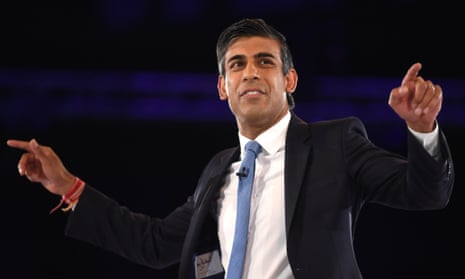Rishi Sunak steps up to the lectern of doom outside Downing Street, illegitimate, unelected, with no manifesto. The ungovernable party avoided the instant cataclysm of a run on the pound that might have come had Boris Johnson been refenestrated. But that’s the end of the good news, the forecast is bleak.
How Sunak will shape up is anyone’s guess, but he has the advantage of the lowest ever bar if he wants to improve on his two disgraced predecessors. One scar he bears is from that boast to Tunbridge Wells Tories that he had deliberately diverted funds from deprived urban areas to affluent places like theirs. Now we shall see if any concept of levelling up has gone for ever. A budget planned in days will reveal his intent. We know our leaders not by their words but by their budget priorities, and there may end whatever blip of a honeymoon he hopes for.
The country now pays a “moron premium” in higher borrowing costs for the stupidity of a party that chose Liz Truss to trash lenders’ confidence in Britain. Now a “sensible” pair of hands turns the ship into that grim “safe” haven we know so well: the captain and chancellor will crack the whip, batten down the public spending hatches and cut rations and pay. The annual inventory of HMS Britain taken last week by the Institute for Government and the Chartered Institute of Public Finance and Accountancy (CIPFA) found shocking conditions in public services. The chancellor, Jeremy Hunt, warns of “eye-watering” remedies: expect leeches and arsenic.
Everyone talks of “hard choices”. But remember they are choices. This threatened programme of austerity is a political choice, not an economic necessity. Truss crashed the last chance the government had to borrow, which would be the normal Keynesian way to ease an oncoming recession. Now, the straitjacket is no borrowing for day-to-day spending, only for investment. But there’s no better time to be honest with voters who feel the depth of the crisis and blame the governing lunatics who chose tax cuts for the best-off instead of necessary tax rises.
Public services are at breaking point: ambulances are stacked for hours outside A&E while headteachers are warning of huge cuts in their stricken state schools, which are still funded below 2010 rates. The Institute for Fiscal Studies’ green budget graphs show steep falls in each department’s budget with cuts of over a quarter in benefits, housing and local councils. Torsten Bell of the Resolution Foundation warns of the “colossal fall in incomes next year”, with a horrific graph showing the depth of social injustice: those at the bottom lose 15% while top earners lose just 3%. The less you have, the more you stand to lose.
In signing up Sunak, the Tory party will embark on even deeper austerity in search of £40bn in cuts. Voters may not mind that the new prime minister is richer than the King, but it doesn’t help if he ignores starving children when only families living on less than a shocking £7,400 get free school meals. Tory MPs frightened for their seats are cakeists who want fiscal discipline. Yet even they may rebel at any medicine that prescribes cuts to services used by pensioners or adult social care.
Expect little talk of “protecting the most vulnerable” or “compassionate conservatism” from Hunt; he has taken Rupert Harrison, the former chief of staff to George Osborne and architect of austerity, as an adviser. Lest anyone forget, Paul Johnson of the IFS describes that era as “completely unique in history for the scale of spending cuts”. The Institute for Government and the CIPFA say further cuts are impossible. There is nothing left to scrape off the bones of Britain’s derelict public services.
But if you want a sign of how the mood is changing, even among the most orthodox disciplinarians, consider the surprise intervention from Mervyn King, the former governor of the bank of England. He said there’s “a strong case for higher public spending” and that austerity would be more difficult this time round. Back in the day, King praised Osborne’s devastating mid-year axe-swinging in his 2010 budget.
Osborne’s decision to make cuts during a recession led to a deeper recession and slower growth. The UK’s growth has since fallen behind equivalent countries. King seems to have learned from this disaster. Now he tells the BBC it’s “time to front up” and tell the public they need to pay “significantly higher taxes”. No more pretending US tax rates can fund European-style spending, he warns. He’s right – and these facts are best coming from a reformed austerian. King not only backed Brexit but even called for a killer no deal with the EU; now he avoids mentioning Brexit at all. But that gives him all the greater heft in calling for tax rises when the likes of Iain Duncan Smith still mendaciously demand “efficiency savings” that don’t exist.
What’s needed, says the economist Paul Johnson, is a five percentage point rise in income tax, lifting tax rates to 25%, 45% and 50%, which, he tells me, would raise about £50bn. That requires a transparent and honest conversation with the public. He suggests correcting many existing tax absurdities: uncap council tax on high-value properties, for example, which still yield less than the old rates. Or have pensioners pay national insurance on all income, as they are one of the groups least likely to be poor (a quarter of pensioners have £1m in wealth or more).
Labour has its own plans for raising taxes, including windfalls, abolishing the non-dom status that allows people born in another country to pay tax only on their UK income, imposing VAT on private schools and cancelling some of the £175bn blown on tax relief, according to the IFS. Wealth is grossly undertaxed and trillions have been secreted in homes that have multiplied in value which their owners aren’t taxed for.
But the hard truth is that the bulk of tax everywhere comes from VAT, income tax and national insurance contributions. Even with taxes on wealth, there’s no avoiding most earners paying more. Politicians never dare advocate tax rises before an election, but this time there is a groundswell of economists preparing the ground for the public to choose taxes over cuts. Had we taxed more to invest in human and physical capital, as France, Germany or the Netherlands have done for decades, we might be up there with them. Low taxes don’t breed prosperity: thanks to Truss, the public now knows it.
With Sunak now leading the country, we can expect two more years of turmoil: look how even the erstwhile “sensibles” such as Ben Wallace and Alok Sharma backed Johnson. He warns he’ll be back, hovering over these “hard choices” to swoop back for an election if Sunak’s punishments prove lethally unpopular. Labour is now all but certain to win according to most psephologists. Rejecting austerity, it promises to account for every penny raised and spent. Voters need to know these are all choices, not an iron destiny.
Polly Toynbee is a Guardian columnist
Crisis at No 10: How long can the Tory government hold on? Join Hugh Muir, Polly Toynbee, John Crace and Jessica Elgot discussing another failed Tory prime minister and what the future holds for the government, in this livestreamed event. On Wednesday 26 October, 8pm–9pm BST. Book tickets at theguardian.com/guardianlive










